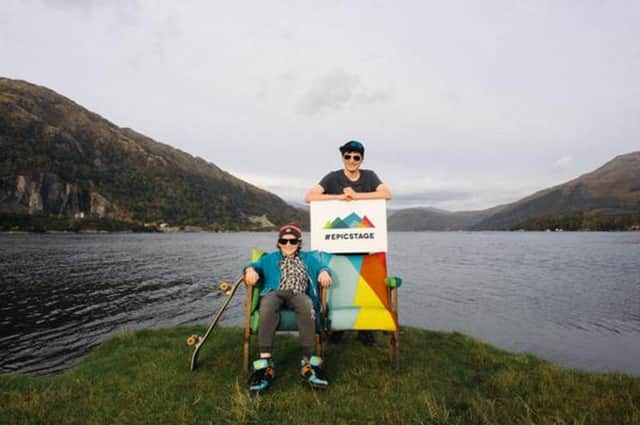Brian Ferguson: Highland culture on the Epic Stage


I suspect their name, Tweed, may be an ironic nod to the more hackneyed clichés about Highland culture, because their music – a bone-shaking fusion of folk, funk and rock – was as far removed from a traditional ceilidh band as it is possible to imagine.
Barely 12 hours later, I am just a few hundred yards away, settling back into a sofa in a modest marquee, which has been transformed into a pop-up haven for literary lovers.
Advertisement
Hide AdAdvertisement
Hide AdThe audience is about the same size, admittedly more sedate than the previous evening, but a few weary faces are familiar from the hotel revelry. This particular crowd – at Ullapool’s annual Loopallu festival a few weekends ago – have crammed in to hear broadcaster Mark Radcliffe on his rise in radio and his frank views on the state of the BBC.
A few hours later the Lancastrian is in a much bigger marquee entertaining several hundred noisy revellers with his own folk band.
As midnight comes around again, I am back in the Argyll Hotel for another helping of late-night music. There are no shortage of enthusiastic dancers cavorting in front of Geordie musician Martin Stephenson.
I slipped out into the blustery autumn night, pondering the power the Highlands has to draw people like Stephenson and Radcliffe from their north of England turf. Driving out of town the following day, Ullapool is bathed in autumn sunshine, and en route to Inverness the answer unfolds before my eyes.
A few days later, another bumper festival weekend is unfolding in a different west coast town, Mallaig, the last stop on the West Highland railway line. The festival’s website boasts it is held in “arguably one of the most beautiful parts of the UK”.
Just across the water lies Sabhal Mòr Ostaig, Skye’s renowned Gaelic college, one of the remote venues chosen by indie band Idlewild for their recent reunion tour, which also took in Ullapool and Mull, where frontman Roddy Woomble moved several years ago. With the view from the Skye building over to Knoydart rivalling anywhere else in the country, it is no surprise to discover it was one of the first stop-off points for a new marketing campaign.
But Epic Stage has nothing to do with VisitScotland’s traditional touchstones of golf, whisky, tartan, castles and ancestry. Instead, it is dedicated to arts and culture in the Highlands and Islands.
Advertisement
Hide AdAdvertisement
Hide AdLaunching officially in Glasgow later this month, the initiative by The Touring Network – a group of promoters who first joined forces 16 years ago – is aimed at showcasing the parts of the country “where the established venue map of Scotland ends”.
The Epic Stage campaign will highlight rural spaces that are regularly turned into intimate performances spaces, including village and school halls, hotels, heritage centres, pubs and even gardens.
Photographer Peter McNally has begun posting spectacular pictures from a three-week tour of the Highlands on Twitter (#epicstage) .
By next year, the roll-out of the campaign – which can already boast about 700 events a year – will see marketing materials available all across Scotland, with large-scale poster sites in the cities and the busiest commuter routes.
By then it is hoped new links will have been forged between all manner of promoters and performers to make the staging of shows and tours not only more financially viable but also much more visible.
If the campaign succeeds in luring new audiences to the most remote of outposts, persuading Central Belt artists to take a risk on a far-flung tour, and creating a new network of cultural centres, some very exciting times will lie ahead in these wild, spectacular and unspoilt parts of the country.